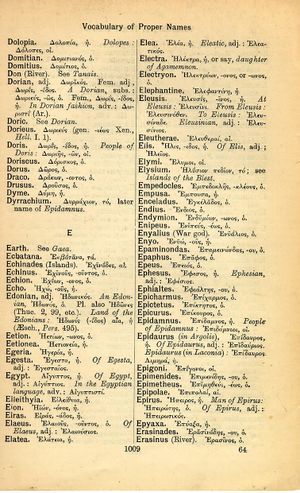Dyrrachium
εἰ ἀποκρυπτόντων τῶν Μήδων τὸν ἥλιον ὑπὸ σκιῇ ἔσοιτο πρὸς αὐτοὺς ἡ μάχη καὶ οὐκ ἐν ἡλίῳ → if the Medes hid the sun, the battle would be to them in the shade and not in the sun
English > Greek (Woodhouse)
Δυρράχιον, τό, later name of Epidamnus.
Latin > English (Lewis & Short)
Dyrrăchĭum: (Dyrrh-), ii, n., = Δυρράχιον,
I a famous sea-coast town of Grecian Illyria, the landing-place of those coming from Italy, formerly called Epidamnus, now Durazzo, Mel. 2, 3, 12; Plin. 3, 23, 26, § 145; Cic. Pis. 38; id. Att. 3, 22 fin.; id. Fam. 14, 1, 6 sq.; Liv. 29, 12 et saep.—Its inhabitants are called Dyrră-chīni, ōrum, m., = Δυρραχηνοί, Cic. Att. 3, 22 fin.; id. Prov. Cons. 3.—Also Dyr-răchēni, Dig. 50, 15, 8.
Latin > French (Gaffiot 2016)
Dyrrăchĭum,¹¹ ĭī, n. (Δυρράχιον), v. maritime d’Épire [auj. Durazzo]: Cic. Fam. 14, 1, 7 || -īnus, a, um, de Dyrrachium : Cic. Sest. 140 ; -īnī, ōrum, m., habitants de Dyrrachium : Cic. Prov. 5 ; Att. 3, 22, 4 ; -ēnī Paul. Dig. 50, 15, 8.
Latin > German (Georges)
Dyrrachium (Dyrrhachium, Durrachium), iī, n. (Δυῤῥάχιον), späterer Name der Stadt Epidamnus (Επίδαμνος) im griech. Illyrien, auf einer Halbinsel am Adriatischen Meere, Landungsplatz bei der Überfahrt von Brundisium her, mit lebhaftem Verkehr und Handel, jetzt Durazzo, Cic. ep. 14, 1, 6 sq. Caes. b.c. 3, 9 sqq. Liv. 29, 12, 3. Vitr. 8, 3, 6. Mela 2, 3, 12 (2. § 56). Catull. 36, 15 (wo Haupt u. Bährens Durrach.): Dyrrachium ire et redire, Anspielung auf Ciceros Exil, Macr. sat. 2, 6, 6. – Dav. Dyrrachīnus, a, um, dyrrachinisch, litus, Cic. Sest. 140: proelium, Caes. b.c. 3, 80: munitio, Suet. Caes. 68. – Plur. subst. Dyrrachīnī, u. -ēnī, ōrum, m. (Δυῤῥαχηνοί), die Dyrrachiner, gew. Form -īni, Cic. ad Att. 3, 22, 4 (wo cod. M1 Durachini), Plin. 14, 30: Form -ēnī, Paul. dig. 50, 15, 8. § 8. M. – / Die Schreibung Dyrrach. (Durrach.) ist die der besten Hdschrn. u. besten Ausgaben; nur Baiter und Wesenberg haben noch in Cic. epp., sowie Hofmann in Caes. b.c. Dyrrhachium.

